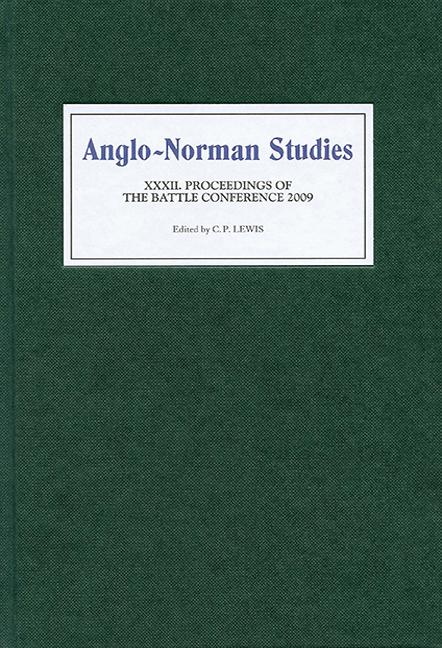Book contents
- Frontmatter
- Contents
- List of Maps and Tables
- Editor's Preface
- Abbreviations
- The Peace of God and Bishops at War in the Gallic Lands from the Late Tenth to the Early Twelfth Century
- Ad erudiendum tradidit: The Upbringing of Angevin Comital Children
- Coming and Going: The Use of Outdoor Space in Norman and Anglo-Norman Chronicles
- The Urban Transformation in England, 900–1100
- The Taming of the Laity: Writing Waltheof and Rebellion in the Twelfth Century
- Close Relations? Some Examples of Trade Links between England and the Towns and Ports of Lower Normandy in the Thirteenth and Early Fourteenth Centuries
- The Roots of the English Royal Forest
- Knighthood and Chivalry in the Histories of the Norman Dukes: Dudo and Benoît
- Prayers for the King and Royal Titles in Anglo-Norman Charters
- Domesday Mortlake
- Miscellaneous Endmatter
The Taming of the Laity: Writing Waltheof and Rebellion in the Twelfth Century
Published online by Cambridge University Press: 28 April 2017
- Frontmatter
- Contents
- List of Maps and Tables
- Editor's Preface
- Abbreviations
- The Peace of God and Bishops at War in the Gallic Lands from the Late Tenth to the Early Twelfth Century
- Ad erudiendum tradidit: The Upbringing of Angevin Comital Children
- Coming and Going: The Use of Outdoor Space in Norman and Anglo-Norman Chronicles
- The Urban Transformation in England, 900–1100
- The Taming of the Laity: Writing Waltheof and Rebellion in the Twelfth Century
- Close Relations? Some Examples of Trade Links between England and the Towns and Ports of Lower Normandy in the Thirteenth and Early Fourteenth Centuries
- The Roots of the English Royal Forest
- Knighthood and Chivalry in the Histories of the Norman Dukes: Dudo and Benoît
- Prayers for the King and Royal Titles in Anglo-Norman Charters
- Domesday Mortlake
- Miscellaneous Endmatter
Summary
In the early hours of 31 May 1076, Waltheof, earl of Northumbria, was about to be decapitated. He was one of the few native nobles who had retained his title under the new Norman regime, but had been found guilty of treason for his part in a rebellion against William the Conqueror. For a year in the king's prison at Winchester he had been the model of good behaviour, a heros,
a man of great and elegant physique, exceeding many thousands in his largesse and courage, a devoted worshipper of God, a humble auditor of priests and of all religious, and a kind lover of the Church and the poor. On account of these and of many other spiritual gifts in which, in the lay order, he delighted to a remarkable degree, he was dearly loved by his own subjects and by God-fearing men everywhere, and it was generally supposed that he would be released from imprisonment.
Alas for Waltheof, this was not to be. He was taken by Normans to St Giles's Hill, just outside the town. He divided his rich garments amongst the clergy and the poor who happened to be there, and prayed. The Normans were worried ‘that the citizens would wake and … show sympathy for their noble fellow countryman by murdering the royal guards’, and told him to get a move on. Waltheof asked that he might at least say the Lord's Prayer, for the sake of his soul and theirs. On reaching ‘And lead us not into temptation’, he faltered, breaking down into tears and general lamentation. Becoming impatient, the executioner decided to proceed, and cut off the prisoner's head with his sword. Bystanders were somewhat surprised to hear the severed head continue, ‘But deliver us from evil. Amen.’ Presumably discomfited by this, the executioners unceremoniously dumped the corpse in a ditch, but this did not prevent rumours spreading of Waltheof's miraculous determination to finish his prayer despite being so rudely interrupted. Two weeks later, Waltheof's wife obtained the king's permission for Ulfketel, abbot of Crowland in Lincolnshire, to retrieve the corpse and take it back to Crowland. Remarkably, his body was ‘incorrupt, with the blood as fresh as if he had just died’.
- Type
- Chapter
- Information
- Anglo-Norman Studies XXXIIProceedings of the Battle Conference 2009, pp. 79 - 95Publisher: Boydell & BrewerPrint publication year: 2010



